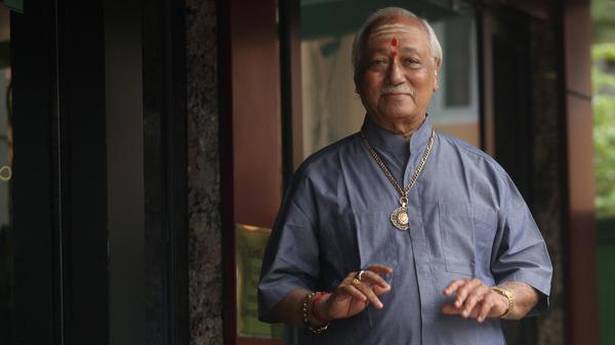‘Music Doesn’t Let Me Age’
In conversation with TV Gopalakrishnan
When you meet 83-year-old mridangam maestro TV Gopalakrishnan, you can’t miss noticing his Palakkad-Iyer accent, childlike curiosity, diamond kadukkan, silk jibba, gopichand and gold bracelets.
An accomplished vocalist-violinist, he’s one of the rare artistes to be awarded the Sangeet Natak Akademi Award and Padma Bhushan for his contribution to carnatic music. Despite having an eventful journey of more than seven decades in the field, he says humbly that he’s still a student.
Born in 1932 in a family of illustrious musicians at Thripunithura, he started playing mridangam when he was four and performed on stage when he was six. “What I am today is because of my guru Chembai Vaidyanatha Bagavathar. When I came to the city, there weren’t many sabhas. In fact, it was tough to make a living. I had to prove myself constantly and display my individualistic traits,” says Gopalakrishnan. He was fortunate to have been able to stay in Chembai’s house and imbibe his teachings.
Referred to as TVG, he has been an accompanist to legendary artistes like S Balachander, Dwaram Venkataswamy Naidu, MS Gopalakrishnana and M Balamuralikrishna among others. He’s one of the pioneers to master both carnatic and Hindustani classical music. “When I accompany someone, I go by his or her music excellence. The rest doesn’t count,” he says.
Having presented hundreds of recitals as instrumentalist and vocalist, across the world, he has collaborated with artistes of various genres and sensibilities including international drummer and composer Franklin Kiermyer among others, in live performances.
The founder of Indian Academy of Music and Arts (IAMA) has been successful in identifying budding musical talent and grooming them. A few of whom he has trained include Rajkumar Bharathi, Madhu Balakrishnan, Sivamani, Kadri Gopalnath and TV Vasan among others.
According to Gopalakrishnan, while there are a lot of well-talented musicians, the number of mentors is few. “There’s no Sudha Raghunathan without ML Vasanthakumari. Vocalists like Nithyashree Mahadevan, Sowmya and TM Krishna would not have become great had they not been properly trained or mentored,” he says.
Gopalakrishnan says that true musicianship lies in making one’s students socially responsible and conscious. “I love teaching, it makes me feel young. I had to update myself often, and it’s quite challenging,” he says. According to him, music is highly energising and doesn’t let him age. Reminiscing his early Margazhi festivals, he says, the kutcheri season wasn’t a long-drawn affair. “Years ago, it used to be a 10-day celebration of music and dance. When you attend a kutcheri of a renowned musician, you can spot the fellow musicians in the audience. Those were definitely the good old days,” he says.
Talking about the honours and awards he has received, Gopalakrishnan says they are an identity of his hardwork.
“Awards bring in more responsibility and I feel I need to do more to make classical music accessible to the ordinary section of society. See, music is an evolving art. There’s no end to it. A lifetime isn’t enough to learn music,” he says. He adds that Indian classical music needs more patronage. “Newspapers should allot more space and TV channels should allot more time for classical music. Corporates could adopt senior musicians and artistes. But, why do we expect the government to do everything?”
(The piece was originally written for The New Indian Express)



Comments
Post a Comment